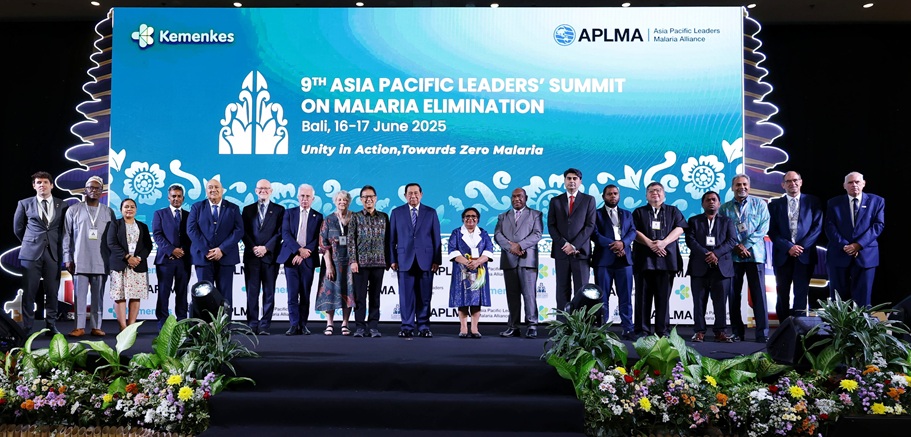
Image Credit: Asia Pacific Leaders Malaria Alliance
The Government of Indonesia in partnership with the Asia Pacific Leaders Malaria Alliance (APLMA), hosted the 9th Asia Pacific Leaders’ Summit on Malaria Elimination on 16 and 17 June 2025 in Bali, Indonesia.
With the theme “Unity in Action, Towards Zero Malaria”, the annual summit convened political leaders, experts and stakeholders to reaffirm collective commitment to eliminating malaria across the Asia Pacific region by 2030.
Centered around three critical areas: strong political leadership, enhanced regional cooperation and sustainable financing. The summit was graced by His Excellency, Former President Susilo Bambang Yudhoyono, Special Advisor to APLMA and hosted by the Honorable Minister for Health Budi Gunadi Sadikin of the Republic of Indonesia.
Drawing over 250 participants from across the region and beyond, it further brought together health ministers from Lao PDR, Pakistan, Papua New Guinea, Solomon Islands, Timor-Leste and Vanuatu. Global health leaders – including Dr. Saia Ma’u Piukala, World Health Organization Regional Director for the Western Pacific; Dr. Lucas De Toca, Ambassador for Global Health, Department of Foreign Affairs and Trade, Australia; Christopher Elias, President of Global Development of the Gates Foundation; Peter Sands, Executive Director of the Global Fund; Simon Bland, CEO of Global Institute for Disease Elimination; and Dr. Michael Adekunle Charles, CEO of RBM Partnership to End Malaria – joined other senior government officials, national malaria program directors and technical experts, demonstrating a united front in the fight against malaria.
Unveiled during the summit, the Indonesia’s Call to End Malaria Initiative (ICMI) – is the cornerstone of Indonesia’s commitment to malaria elimination and an innovative strategy aimed at leveraging the governmental leadership to accelerate malaria elimination. Recognizing the urgent necessity to tackle coordination challenges, particularly in complex regions such as Papua, the ICMI serves as a central mechanism to align efforts across all levels of government – national, provincial, and district.
By bringing together key ministries – such as health, finance, home affairs, planning, and defence – alongside state-owned enterprises, NGOs, community leaders, and the private sector, the ICMI fosters a collaborative and multisectoral approach to tackling malaria.
The initiative is empowered to streamline coordination and ensure effective implementation across all levels of governance. This decisive action underscores Indonesia’s unwavering dedication to addressing malaria both domestically and regionally, setting the groundwork for impactful partnerships throughout Asia Pacific.
Additionally, during the summit's sidelines, Hon. Minister Budi and Honorable Vice Minister for Home Affairs Ribka Haluk chaired a high-level forum with Papua governors to address the region's unique health challenges, which are compounded by complex socio-economic conditions. The forum saw the signing of a Governors’ Commitment and endorsement for launching a Papua Malaria Consortium (‘Konsorsium Malaria Papua’) to bring together both Papua governors and multisectoral stakeholders to accelerate a targeted approach towards malaria elimination in Papua.
Building upon the collaborative spirit emphasized during the summit, Indonesia and Papua New Guinea further solidified their commitment to malaria elimination by initiating a Bilateral Joint Action Plan. This strategic framework is designed to enhance cross-border cooperation, ensuring that both nations align their efforts in tackling malaria while upholding principles of reciprocity, equality, and mutual benefit.
The summit placed strong emphasis on innovative strategies to strengthen health systems and mobilize equitable resources, ensuring a unified approach to tackling malaria across Asia Pacific. The first day featured technical sessions with national and international experts, focusing on the latest evidence, innovations and strategies for malaria control and elimination. On the second day, high-level ministerial dialogues were held to explore opportunities for co-financing and developing sustainable multi source financing solutions for elimination initiatives including the EDEN Initiative (Ending Malaria and other Climate-Sensitive Vector Borne Diseases through Enhanced Regional Partnerships).
Minister Budi emphasized Indonesia’s steadfast commitment to achieve elimination. He said, “Malaria is not just a health issue – it is a development issue. To truly eliminate malaria, we must go beyond the health sector. That’s why we launched Indonesia's Call to End Malaria Initiative – to mobilize the whole of government, and whole of society support. Through stronger leadership and better coordination, we will bring lasting solutions to our most affected regions, especially Papua.
Delivering the keynote address, H.E. Former President Yudhoyono stressed the importance of regional collaboration, he said, “This summit is more than a meeting. It is a reaffirmation of our collective commitment. And nowhere is this spirit of cooperation more vital than in the Central Indo-Pacific region. We have the technical expertise, the innovation, and the regional momentum to succeed – because every life saved, every community protected, every child who grows up free from malaria – is a victory for humanity.”
With just five years remaining to achieve the global Sustainable Development Goal of eliminating malaria by 2030, the 9th Asia Pacific Leaders’ Summit on Malaria Elimination served as a strategic platform to showcase the region’s progress, innovations, and renewed commitments. APLMA and the Government of Indonesia, along with the regional health ministers, global health leaders and experts present, reaffirmed dedications to advancing regional health security and accelerating efforts toward a malaria-free Asia Pacific.




